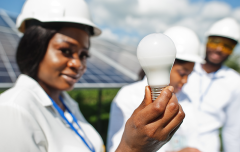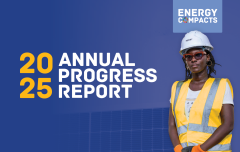New RISE report highlights growth in sustainable energy policies
The number of countries with strong regulatory frameworks for sustainable energy has more than tripled from 17 mostly advanced economics in 2010 to 59 throughout the world in 2017, according to RISE 2018, a new World Bank report that analyses sustainable energy policies in 133 countries.
The new edition of RISE (Regulatory Indicators for Sustainable Energy) is part of the World Bank’s contribution to Sustainable Energy for All and the achievement of Sustainable Development Goal 7: ensuring universal access to affordable, reliable, sustainable and modern energy by 2030.
RISE provides a global scorecard to measure progress in three key energy areas -- electricity access, renewable energy and energy efficiency -- as well as access to clean cooking.
The latest RISE report found that improvements in renewable energy policies were most significant in the countries with the largest energy consumption. The percentage of countries establishing advanced policy frameworks for energy efficiency grew more than ten-fold between 2010 and 2017. Among countries with large electricity access gaps, 75% have put in place policies and regulations needed to expand energy access.
But there is still large room for improvement in overcoming significant barriers to global progress on sustainable energy. Policies to decarbonize heating and transportation, which account for 80% of global energy use, continue to be overlooked.
Among the SDG7 target areas, clean cooking continues to be the most neglected and underfunded by policymakers. While the report finds some evolution in policy frameworks since 2010, there has been little progress on the setting of standards for cookstoves or on consumer and producer incentives to stimulate the adoption of clean technologies.
RISE is an important tool to help governments assess whether they have the necessary policy and regulatory frameworks in place to drive progress on the energy transition. It enables governments to measure their performance against regional and global peers. The report can also be used by the private sector to identify investment opportunities for sustainable energy projects, products and services in national markets.
Riccardo Puliti, Senior Director for Energy and Extractives at the World Bank said: “Policy matters. RISE 2018 confirms the numbers that make it clear that policy is a leading indicator of the world’s sustainable energy transition. But the report also contains a warning that without accelerated adoption of good policies, and strong enforcement, the world’s climate goals and SDG7 are at risk.”
With half of the world’s countries still falling short of adopting advanced policy frameworks for sustainable energy, it will likely take them until 2025 on average to catch up--just five years from the SDG7 deadline.
In examining progress in closing the energy access gap, the report found that a quarter of the countries with the lowest electrification rates have put in place advanced policies and regulations to address the issue. These include the five countries that have seen the biggest increases in their access rates since 2010--Burkina Faso, Democratic Republic of Congo, Ethiopia, Kenya and Tanzania.
Countries with large electricity access gap are also turning their attention to off-grid solutions. The share of low-access countries adopting measures to support mini-grids and solar home systems has soared from around 15% to 70% in 2017. However, the deteriorating fiscal position of national utilities is putting progress at risk in low-access countries. The number of utilities in these countries meeting basic creditworthiness criteria dropped from 63% in 2012 to 37% in 2016
In terms of renewables, while 37% of the countries surveyed had national renewable energy targets in 2010, this had grown to 93% by 2017. By 2017, 84% of the countries had a legal framework in place to support renewable energy deployment, while 95% allowed the private sector to own and operate renewable energy projects. But work still needs to be done on standards to fully integrate renewable capacity into national electricity grids.
Policy makers are paying less attention to energy efficiency than to renewable energy, although the former offers the most effective way of greening the energy sector. Only 25% of countries have advanced energy efficiency policy frameworks, although they do account for 66% of world energy consumption, while 44% of countries have few or no meaningful energy efficiency policies, such as energy codes for buildings, utilities and transportation,
RISE 2018 is the second edition of RISE and contains many new features over the inaugural 2017 report, including policy time trends since 2010, a greater emphasis on tracking policies that support enforcement, broader coverage of the heating and transportation sectors, and a pilot assessment of the policy environment for clean cooking in a dozen large access-deficit countries.
The data is freely available at rise.esmap.org. The online interface enables users to customize the information for each country’s power sector and policy framework.




